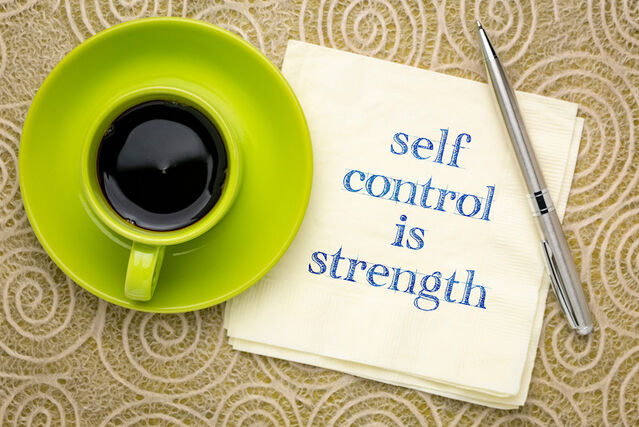Self-Control
Permissive Parenting Can Lead to Adult Self-Regulation Problems
Struggle with self-discipline? The reason may surprise you.
Posted March 6, 2022 Reviewed by Jessica Schrader
Key points
- Permissive parents may do many things right, but they don't manage to give their children enough structure or limits.
- New research shows the link between permissive parenting and self-control problems in adulthood.
- Cultivating an internal voice that holds you accountable with compassion can allow you to structure and limit yourself far more effectively.

Permissive parenting can be emotionally neglectful and harmful. But being raised by some types of permissive parents could actually seem like a lot of fun. With few rules strictly enforced and relatively free rein to do what you like, you may grow all the way to adulthood viewing your parents as your friends.
However, there is a dark lining beneath that silver cloud. All that looks well is not well, and it can lead to some very perplexing challenges for the child decades later.
Permissive Parenting
Permissive parents run the gamut from loving, well-meaning parents to crack-addicted or sociopathic and everything in-between. The only requirement to qualify as one is to essentially let your child do what they want, or fail to set enough limits. It usually involves a shortage of consequences and structure as well as a surprising absence of parent-child conflict.
Types of Permissive Parents
Conflict avoidant. No matter how you do it, setting limits with a child requires a certain amount of conflict. Dealing with an unhappy or angry child or teen yelling, “I don’t wanna ______,” is frustrating. Parents who are inherently uncomfortable with conflicts of any kind may manage to avoid these types of situations with their children by simply setting few limits.
Overwhelmed or struggling. These are parents who are overwhelmed with life. They may have family, financial, or other challenges that give them little time or energy to set and enforce limits with their child.
Traumatized. A 2022 study by Franz and Kumar, et. al, found that many permissive parents have PTSD from some prior life experience that interferes with their ability to fully engage in structuring their children properly.
Self-involved. Parents who are narcissistic, addicted, workaholic, sociopathic, or otherwise preoccupied with getting their own needs met may be unable to pay enough attention to see the natural needs of their own child for limits and consequences.
Emotionally neglectful. This category encompasses all the types above. Emotionally neglectful parents are not emotionally aware enough to see and respond to their children's feelings and emotional needs. Even if they do mean well, they lack the emotion skills to tune in, see what their child needs in terms of emotional education, feedback, structure, and limits, and provide it.
The Adult Child of the Permissive Parent
As a specialist in childhood emotional neglect, countless clients have sat in my therapy office describing frustrating struggles with procrastination, self-discipline, self-motivation, and self-control. All of these challenges fall under the umbrella of one term: self-regulation.
Self-regulation is the ability to govern your own choices and behaviors, whether it be starting or completing an unpleasant task, or stopping yourself from engaging in an activity that’s not good for you like over-eating or drinking, for example.
A 2020 study by Sur & Cleary, et. al, showed a distinct connection between a child’s ability to self-regulate and the type of parenting they received, confirming previous research findings and supporting both attachment research and current family systems theory.
Yet most people who struggle with self-regulation blame themselves for it, viewing it as a personal weakness or an inherent deficiency.
I have seen that many children of permissive parents can easily flip back and forth between internally attacking themselves for their problems with self-regulation and letting themselves off the hook far too easily.
Few ever imagine that the cause is actually something they didn’t get in childhood and must now cultivate in themselves.
6 Life Lessons Children of Permissive Parents May Miss
- Self-structuring: Setting up healthy routines for yourself and then following them.
- Self-limiting: Stopping yourself at the right time from the right things.
- Self-motivating: Forcing yourself to do things, especially when they are unpleasant or tedious.
- Self-knowledge: Did you learn as a child about your own specific weaknesses and challenges and that it’s OK to have them? If not, you may grow up to avoid difficult things altogether.
- An internal voice that holds you accountable with compassion. You didn’t receive this voice enough from your parents so you haven’t internalized it for yourself. That’s why you go back and forth between self-attack and letting yourself off the hook.
- The emotional education and awareness that could be helping you manage the interference of your feelings with your intentions. For example, you really need to finish a project, but you’re feeling burdened and overwhelmed. So instead of managing those feelings and starting the task, you take a nap.
What You Can Do Now
You are not inherently flawed or weak and you can teach yourself how to regulate. So please stop being angry at yourself for something that’s not your fault.
Start practicing the internal voice of compassionate accountability. This voice says things like, “I know you’re overwhelmed and that’s why it’s so important to get this project off your plate. Now, get started.” Or, if you’ve already made a mistake, it may say, “OK, you slipped up. Things do happen, but that just makes it more important to be on top of this today. You can do it.” This voice of compassion is what your parents might have said if they were more involved in structuring you. Holding yourself accountable with compassion is that middle ground that actually motivates you instead of draining your energy.
Become more aware of your feelings that are getting in the way and start learning how to manage them. Knowing when you are having a feeling, identifying the feeling, and actively deciding what to do with it is an important part of self-regulation and sets you up to have control over yourself. It is also a healing process from childhood emotional neglect.
Holding yourself accountable while simultaneously holding compassion in your heart for why something is hard for you is a great challenge for legions of people who grew up in permissive families.
But, the reality is that you deserve both. You deserve to be held accountable and you deserve compassion. You didn’t get enough of either in your childhood, so, why not start giving them to yourself now?
© Jonice Webb, Ph.D.
References
To determine whether you might be living with the effects of childhood emotional neglect, you can take the free Emotional Neglect Questionnaire. You'll find the link in my Bio.
Franz, M. R., Kumar, S. A., Brock, R. L., Calvi, J. L., & DiLillo, D. (2022). Parenting behaviors of mothers with posttraumatic stress: The roles of cortisol reactivity and negative emotion. Journal of Family Psychology, 36(1), 130–139. https://doi.org/10.1037/fam0000865
Sur, B., Cleary, A., Rohrbaugh, M. J., Ferrer, E., & Sbarra, D. A. (2020). Beyond the “self” in self-regulation: Family interaction modulates situational self-control by adolescent drug users. Journal of Family Psychology, 34(3), 322–332. https://doi.org/10.1037/fam0000598




